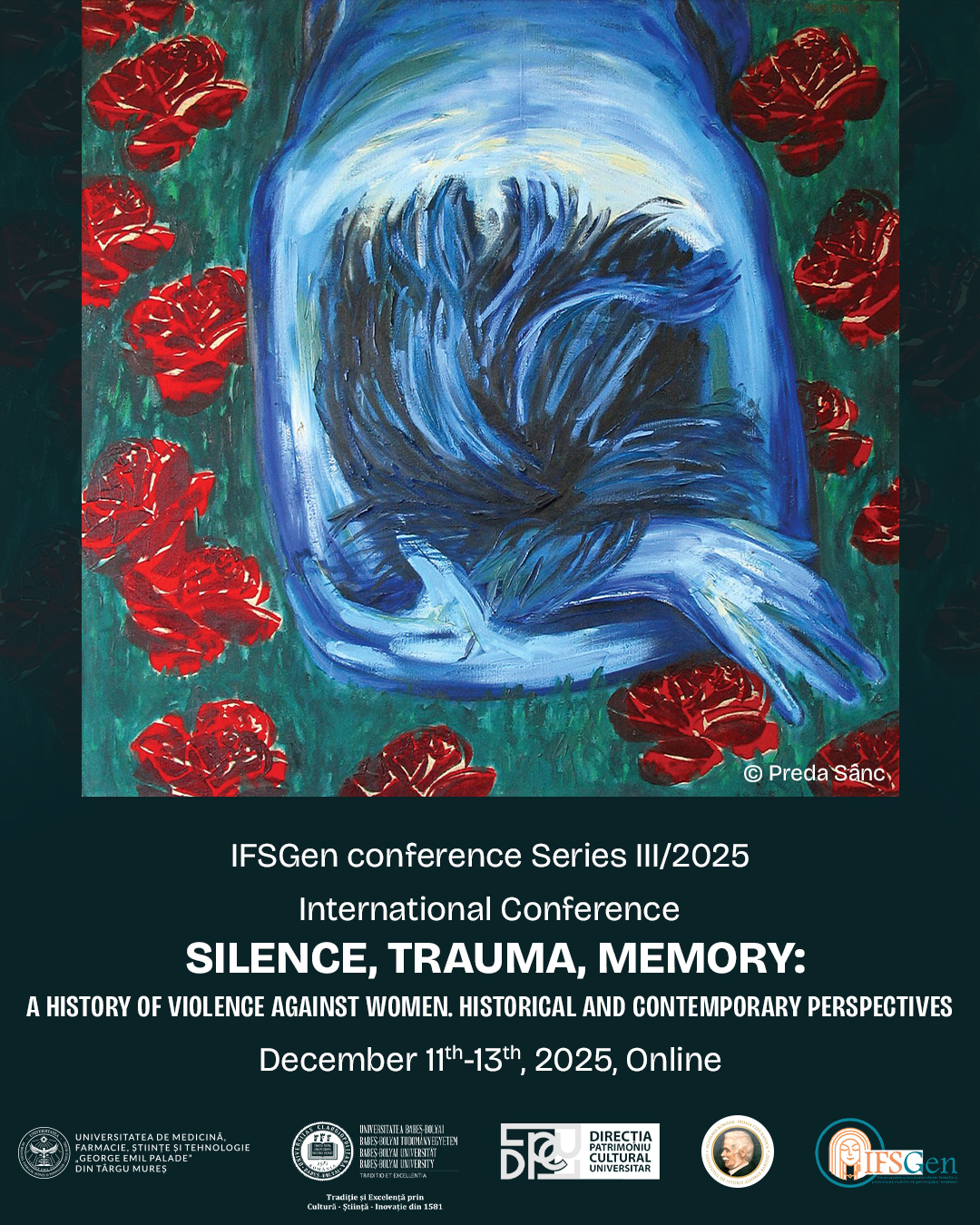IFSGen. The Network for Women and Gender History, is pleased to invite you to the third conference in the IFSGen series.
As historian Teodor Nicoară notes, humanity has endured various forms of violence throughout history: from rural unrest like riots and tumults, to pre-modern and modern conflicts such as revolutions, wars (civil and religious), judicial and domestic violence. Some of these acts have even reached pathological levels, including passional crimes, violent crimes, political upheavals, and murders of all kinds. Urban violence, protests, and appeals have also been evident, leading to more extreme instances in recent times—such as terror (Bolshevik, Nazi, communist, etc.), war, and severe violence like the Holocaust and genocide, culminating in contemporary suicidal terrorism.
We are therefore talking about a plurality of manifestations, from physical, symbolic, military, and mental violence in which elements like gender, class, race, or ethnicity could be invoked or used as reasons for violence. Any act of aggression, whether small-scale or large-scale, requires the creation of a justification for the act.
Concern for the analysis and understanding of forms and acts of violence, from a historical or interdisciplinary perspective, is reflected in consistent international scientific production. For example, we mention the works published by Norbert Elias, The Civilizing Process, 1939; Michel Foucault, Surveiller et punir, 1975; or Robert Muchembled, Une histoire de la violence: De la fin du Moyen Âge à nos jours, 2008.
Regarding the Romanian space, concerns about female violence have developed especially researchers in areas such as gender studies. With landmark value we mention the works signed by: Ruxandra Cesereanu (Imaginarul violent al românilor, București, Humanitas, 2003), Mihaela Miroiu (Neprețuitele femei. Patriarhat, feminism și schimbare socială, Iași, Polirom, 2006) or Ionela Băluţă, Tufiş Claudiu (Barometrul violenţei de gen 2022: violenţa împotriva femeilor în România: reprezentări, percepții, Cluj-Napoca: Presa Universitară Clujeană : Dota, 2022).
Unfortunately, Romanian historical writing generally lacks in addressing this theme, with few exceptions like Prof. T. Nicoară's work on violence or Nicoleta Roman's studies on domestic violence. Are documentary limitations enough to explain this? Or is it because the subject is considered 'uncomfortable", tied to social taboos, and often concealed due to fear, shame, or victimization? These are some of the questions we aim to explore at this conference.
History does not offer solutions or forecasts, but it aids in understanding the processes, events, and factors that have led women to become victims of various forms of violence. Combining historical perspectives with insights from psychology, sociology, and gender studies can help explore the origins, diversity, and causes behind the statistics and grim realities in Romania in 2025. At the time of preparing this call for the current year, there had already been registered 30 cases of femicides, along with thousands of domestic violence cases recorded annually, averaging 14 cases per hour in the first months of 2025.
We welcome proposals from disciplines like family history, social history, law, cultural studies, military history, and medical history that can enrich our understanding of violence through dialogue. While our main focus is on domestic violence, we also encourage submissions on related subjects.
We also invite researchers from related fields—such as gender studies, psychology, sociology, and public policy—to join a dialogue. The goal is to understand the occurrence and acceptance of the phenomenon, and to contribute to the analysis of stereotypes (e.g., women, described as created from Adam's rib, seen as inferior and submissive) and prejudices (e.g., the ‘van is torn from heaven...’).
Topics we aim to address:
- Domestic violence;
- Evolution of norms and legal frameworks for classifying violence;
- Spousal relationships;
- Collective violence;
- Wars and violence against women;
- The concentration phenomenon (prisons, punishments);
- The female crime phenomenon;
- Trauma and social stigma.
The conference will take place online. We invite you to send us your proposals, in the form of a summary, in Romanian and in English Proposals will be submitted electronically by completing the available form here: https://form.jotform.com/252653686398373
Termenul limită: 10 noiembrie2025.
Toate propunerile primite vor fi supuse unui proces de evaluare. Lista lucrărilor selectate va fi comunicată până pe data de 17 noiembrie 2025. Vă rugăm să consultați site-ul conferinței sau să urmăriți e-mailurile oficiale pentru detalii privind acceptarea și programul conferinței.
For more information:
Email: ifsgen@umfst.ro
Contact persons:
Associate Professor Georgeta Fodor, UMFST „G. E. Palade”, Târgu Mureș, georgeta.fodor@umfst.ro
Scientific Researcher Daniela Deteșan, Institutul de Istorie „George Barițiu”, Cluj-Napoca, detesan31@gmail.com
Documentarist Claudia Septimia Sabău, Universitatea Babeș-Bolyai, Cluj-Napoca, claudia.sabau@ubbcluj.ro

